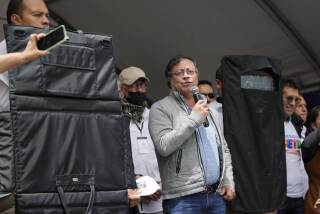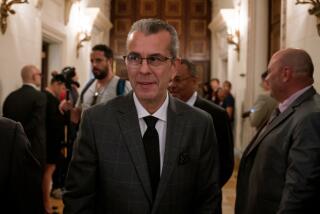Afghanistan election review will be based on sample
- Share via
KABUL, AFGHANISTAN — After weeks of wrangling, two agencies overseeing Afghanistan’s fraud-tainted election agreed Monday to rely on statistical sampling rather than an in-depth investigation of alleged voting irregularities.
The Independent Election Commission and the U.N.-backed Electoral Complaints Commission said the new approach, “based on international standards,” would help ensure the credibility of the Aug. 20 election.
By some estimates, more than 20% of the 5.5 million votes cast are suspect. Allegations are widespread that ballot boxes were stuffed, ballots pre-marked and polling stations closed.
Supporters of the deal say that streamlining the election review could reduce political instability stemming from uncertainty over the outcome. Critics say that anything less than a full investigation risks undermining faith in a fair outcome -- which could imperil counter-insurgency efforts and drive more Afghans away from the U.S. and its allies.
The two sides hope to agree on a methodology within 48 hours. Grant Kippen, chairman of the U.N.-backed commission, acknowledged that the “devil’s in the details.”
“Whatever process is agreed to, it has to be proper, fair and transparent,” Kippen said.
Preliminary results give incumbent President Hamid Karzai 54.6% of the vote, compared with 27.8% for his chief rival, former Foreign Minister Abdullah Abdullah. But watchdog groups say the questionable votes are more than enough to bring Karzai’s share below 50%. If that happens, the two would compete in a runoff.
“Certainly there is expediency in this decision, otherwise they’d investigate each complaint properly,” said John Dempsey, Kabul-based senior analyst with the U.S. Institute of Peace, a Washington think tank.
Others, however, say the benefit of settling on a president soon may outweigh the ideal of examining every allegation in detail.
“I think the ECC is trying to do the right thing,” said Karin von Hippel, a senior fellow with the Center for Strategic and International Studies in Washington. “The ECC is aware of time issues.”
Snow will soon make many parts of the country all but inaccessible, potentially delaying a runoff until spring.
The scandal-tainted election has added to worries about corruption in Afghanistan and whether the war against the Taliban is winnable.
The government election commission has been under pressure from Karzai supporters to downplay fraud allegations and put their man over the top in the first round, analysts said. Its international counterpart has vowed to methodically and carefully ensure the integrity of the process.
“We need a fair election, even if it takes 10 rounds,” said a policeman in Kabul, who declined to be identified because he has a government job. “The problem is, they didn’t appoint qualified people to register the voters.”
Karzai has conceded that some fraud occurred, but he said it was blown out of proportion by the Western media and international observers.
The debate over how to review the election results has spilled over to the U.N. The world body’s top official in Afghanistan, Norwegian diplomat Kai Eide, is said to favor greater accommodation with the Karzai administration. His deputy, American Peter Galbraith, reportedly pushed the government hard to explain the perceived irregularities. Galbraith agreed a week ago to leave the country.
“The tension within the U.N. reflects a difference of opinion in how tarnished an election process people should be willing to accept,” Dempsey said.
“I think that all parties hope for a way out of this that will allow Afghanistan to move on quickly, with some sort of deal being struck -- or a runoff held in October,” he said. “No one wants six more months of uncertainty and governing inertia. Afghanistan cannot afford that.”
--
More to Read
Sign up for Essential California
The most important California stories and recommendations in your inbox every morning.
You may occasionally receive promotional content from the Los Angeles Times.













